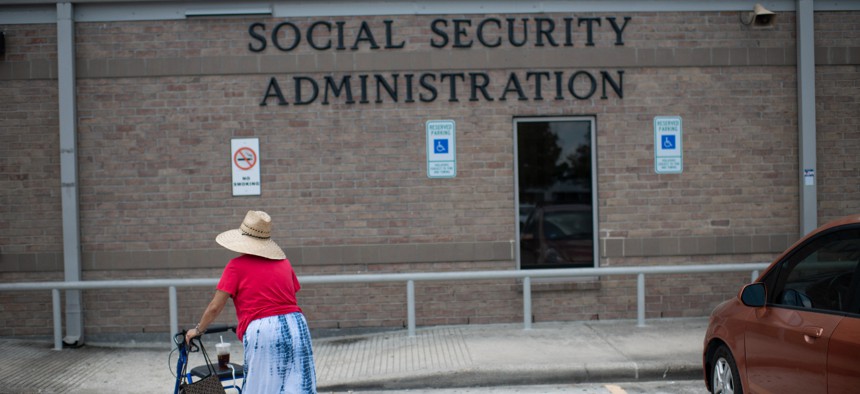
A woman walks into a Social Security office in Houston, Texas on July 13, 2022. Mark Felix for The Washington Post via Getty Images
People Had Trouble Accessing Social Security During The Pandemic and GAO Wants Them to Develop a Plan to Do Better
A recent Government Accountability Office report says SSA is not doing enough to reach vulnerable populations.
The Social Security Administration struggled with higher demand for its services during the pandemic, and according to a new Government Accountability Office report, the agency did not do enough to reach vulnerable populations or make its services more accessible. According to the report, the COVID-19 pandemic fundamentally changed the way SSA operated. When the pandemic hit, the agency shut down its in-person services and moved to remote and telephone-only services. As a result, the public filed fewer benefit claims with SSA than it had in the previous two years. Some applications can’t be filed online, and some applications online don't have an option for Spanish speakers.
“Average monthly claims were lower from March 2020 through December 2021 for several SSA benefits,” the report reads. “Specifically, they were 18 percent lower for Supplemental Security Income disability benefits, 12 percent lower for Disability Insurance, and 8 percent lower for Supplemental Security Income Old-Age, though Supplemental Security Income claims rebounded in late 2021. Some types of benefits claims declined more for certain populations, such as Spanish speakers.”
The report states that SSA did take steps to address gaps in its service, such as expanding outreach to vulnerable populations and using third parties to help the underserved access benefits, but more needed to be done.
“Not all claimants are able to apply for SSI online and applications in Spanish cannot be submitted online. As a result, SSA cannot fulfill its mission to ensure that its services are equitable and accessible, and some eligible individuals may not apply for benefits. Some SSA offices have assessed specific service delivery changes, but the agency does not have a coordinated process for assessing lessons learned from the COVID-19 pandemic and taking related corrective actions, which could leave SSA vulnerable to other crises in the future,” the report says.
GAO analyzed SSA data from March 2018 through December 2021 for their findings as well as interviewed SSA staff, officials, and stakeholders, along with disability advocates and employee groups. The agency recommended several changes for SSA, including:
- The Commissioner of SSA should develop a plan—with clear steps, goals, metrics, and timelines—to evaluate the feasibility of obtaining additional race and ethnicity data from other state and federal entities in support of its Equity Action Plan goals
- The Commissioner of SSA should develop a plan—with clear steps, goals, metrics, and timelines—for enabling claimants to apply for Supplemental Security Income (SSI) benefits online
- The Commissioner of SSA should evaluate the feasibility of making online Spanish applications available again for those SSA benefit programs with existing online applications.
- The Commissioner of SSA should implement a coordinated process for assessing lessons learned from the COVID-19 pandemic that includes documentation and dissemination, implementation of corrective action, and incorporation into future contingency planning.
- The Commissioner of SSA should develop an agency-wide plan for managing anticipated increases in SSA's disability workloads
Jeff Nesbit, deputy commissioner for communications at SSA, wrote in a Nov. 22 blog post that SSA needs more money for fiscal 2023. Nesbit said that without the extra funds, SSA will have to freeze hiring and cut funding to its IT investments, among other things.
“It is critical that we have the resources to restore staffing losses and continue our important IT investments or face years of deteriorating services that you will not and should not accept. We must be able to provide timely and quality service to everyone who depends on us,” Nesbit wrote.






